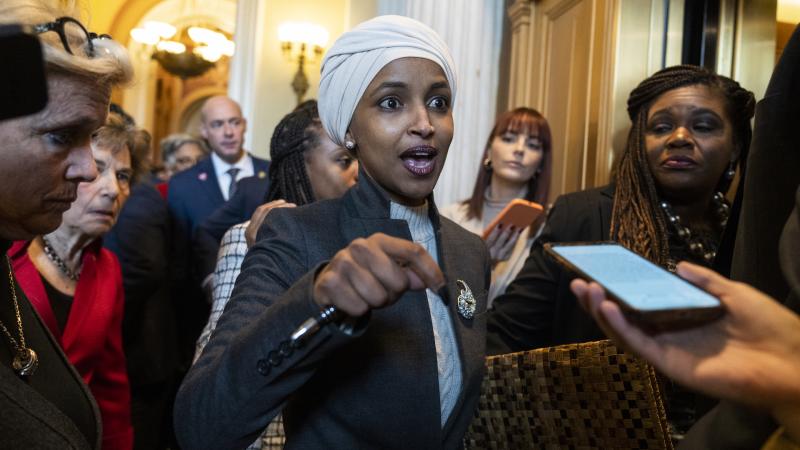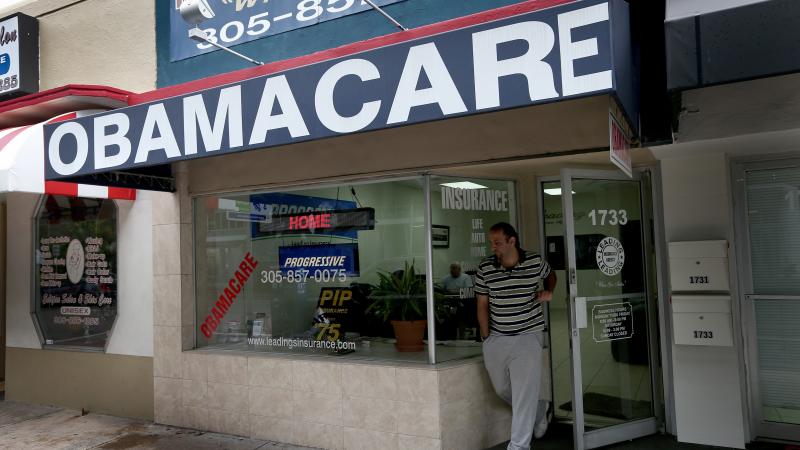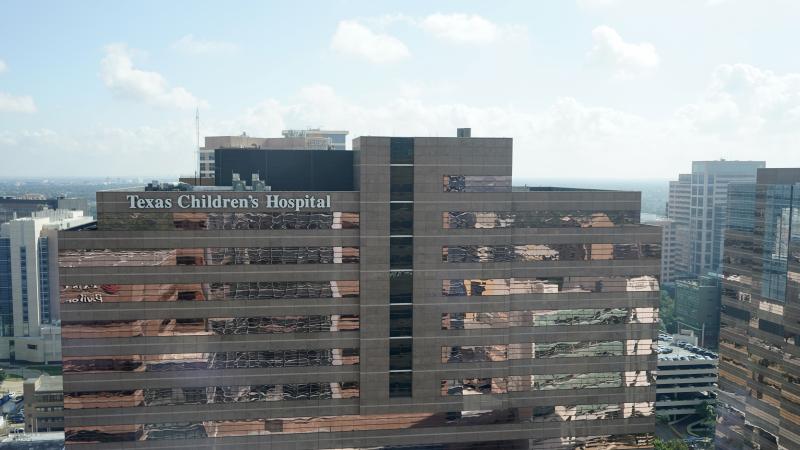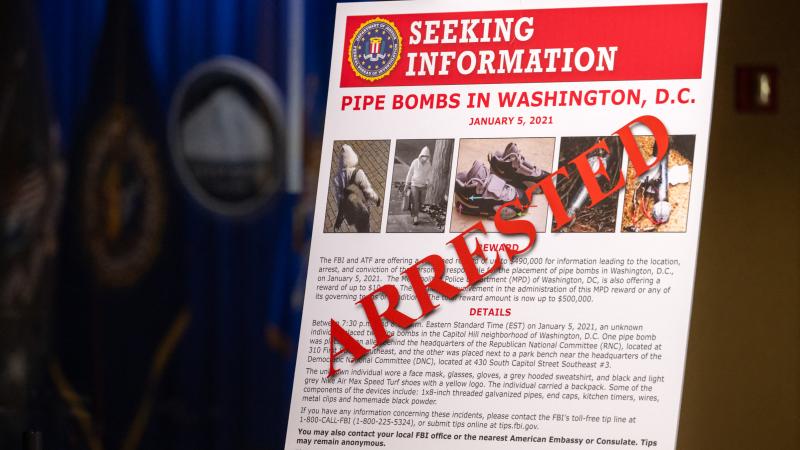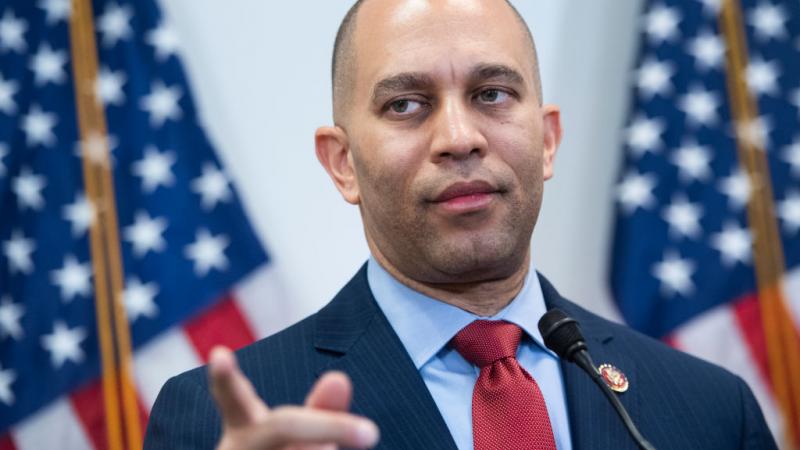Contradictions in the BLM movement

Does the BLM organization actually act in the best interest of Black Americans?
Full Transcript:
David Brody 0:07
And, welcome everybody to The Pod's Honest Truth with David Brody. Hope all is well. Let me just say right now, I am thankful that I am doing this podcast today because, let me just say, just mere hours before this podcast, okay, maybe I'm embellishing about 12 hours or so before this podcast, I was on a tennis court at about 11pm Eastern and let me just tell you, I was giving it my all in a doubles match. What, when you're 55 you play doubles, forget the singles. And I will tell you this, that the fact that I'm not in traction this morning, that's God's grace. That's a blessing from God. And that was my weekend. Not to mention that I went through a pint of ice cream in one sitting. That's always a fun weekend. Also my daughter, oh, by the way, did I say daughter? My daughter. That shows you I'm from the New Jersey, New York tri-state area. My daughter turned 18 this weekend. So, hey, happy birthday to her. You know, it's kind of a low-key affair. Normally 18, big, big deal. But hey, let me just say, kudos to me and my wife. We bought her a car, all right? About a month ago, graduation/birthday. So, we look, we said, 'look, that's what you're getting.' So, 18th birthday, you're getting Chipotle and a TV dinner or something like that. We got to the car.
Anyhow, today on the podcast: the Black Lives Matter movement. Now, I want to highlight what the Black Lives organization is about in totality. Now, please understand, I said the Black Lives Matter organization. In other words, the goals of this movement. I want to be clear here, folks, I'm not talking about the obvious sentiment that black lives matter. Of course, they do. Duh. And yes, the organization obviously stands against police brutality and excessive force and guess what? Hello, so do I. And by the way, if you're not against all of that, then please go sit in a corner put on a dunce cap. Never come out. But just because we're all against police brutality, doesn't mean Christians need to lock arms with an organization that stands for so much more. So, we're going to detail all of that today on the podcast. And you know, the reason I think we need to delve into this more closely is because of a CBS News poll that came out over the weekend. And I want to go through this for a quick moment. Here's what it said. And here's the top line, a majority of the American public, 60%, and it includes more than half of whites, 53%, say they agree with the ideas expressed by the Black Lives Matter movement. And that kind of grabbed me and it was jarring for a moment because it said the ideas expressed by the Black Lives Matter movement. We'll get to those ideas in a moment. If you go deeper in the poll, 87% of Democrats either strongly agree or agree with the ideas of the Black Lives Matter movement. 58% of Independents actually agree or strongly agree, and only 28% of Republicans. And there's actually a Pew poll that shows that the support for the Black Lives movement and their ideas stands at 67%. So, clearly, Americans in this country are all for the BLM movement. Here's the issue with this poll or these polls. Did they fairly represent what the BLM organization and movement actually stand for in totality? Because in these polls, they focused in on police brutality and racial injustice, because that's been the main focus and that's fine. But if people had a more complete view of what they stood for, well, then maybe they would rethink some of how they feel about the Black Lives Matter movement. So, I want to go through this and here's the bottom line on all of this: the BLM movement has many anti-Biblical positions when it comes to traditional Judeo-Christian perspectives on the Bible. In essence, it's all about a radical culture shift and I want to explain this specifically. First of all, they're funded by the Ford Foundation. All right, and that's the world's largest population control organization. They wanted to raise 100 million dollars in 2016. I forgot exactly what the total was, but it was around there for the Movement For Black Lives. It's called MFBL. And let's be, let's understand something. It's not just about police brutality, okay? This is not what it's just about, though. Those are where the headlines have been. That's where the momentum has been and of course, we're all against police brutality. But, there's a lot of other things inside what the Black Lives Movement stands for. And don't take my word for it... take their word for it. I want to read you some of the quotes from their platform. When I say their platform, let me be clear, there's the Movement For Black Lives. That's the MFBL. There's the BLM movement, the Black Lives Matter movement, all of it is kind of an umbrella if you will. And this is what some of these quotes are from. Literally just picked off their websites, it's very simple.
First of all, they promote homosexuality, transgenderism. As a matter of fact, once again, don't take my word for it, here is a quote from their website: "We foster a queer affirming network. When we gather we do so with the intention of freeing ourselves from the tight grip of heteronormative thinking." So, that's on that issue.
Now, as it relates to abortion, this is what they say on abortion: "we deserve, and thus we demand, reproductive justice that gives us autonomy over our bodies and our identities while ensuring that our children and families are supported, safe and able to thrive." By the way, aka on the reproductive justice line, that's abortion. Right, okay? So, hey, here's a memo to the BLM movement. If Black Lives Matter, then why are you radically pro-abortion? All right, pro-choice. You want to say-- I'll say pro-choice. Pro-abortion, pro-choice. Really, I mean, if black lives matter, or, excuse me, if Black Lives actually matter, then why are you radically pro-abortion, because abortion impacts African Americans at a higher rate than any other population group. As a matter of fact, the CDC has an abortion surveillance report and it shows that black women make up 14% of the whole childbearing population. However, 36% of all abortions, were by black women. So that means black women have the highest abortion rate of any group in the country. So, if you use those percentages, and you extrapolate it out, you've got 44 million abortions since 1973, since Roe v. Wade. 19 million of those 44 abortions are black babies aborted in America, and they say Black Lives Matter. So, you've got to kind of think about that for a moment. In addition, they ignore the importance of fatherhood. I mean, this is what they say on their website, quote "we disru-- we disrupt the western-prescribed nuclear family structure requirement by supporting each other as extended families and villages," sounds like Hillary, "that collectively care for one another, especially our children, to the degree that mothers, parents and children are comfortable." So, fatherhood not mentioned at all. It takes a village. Don't worry about the father. The problem is fatherlessness is a real problem, especially within the African American community.
In addition, they're for reparations. As a matter of fact, they say reparations for full and free access for all black people, including undocumented and currently and formerly incarcerated people to lifetime education retroactive, and all of that. They go on to forgiveness of student loans, they support Lifetime Learning programs. Okay, so, so, as you can see, this is a liberal progressive mindset. This isn't just about police brutality. And by the way, from a Christian perspective, you don't ever see anything about a goal of forgiveness or reconciliation when it comes to reparation. Instead, it really is what many people have called a nod to black power. As a matter of fact, they say on their website, this is a quote, "it became clear that we needed to continue organizing and building Black Power across the country." And just, for the record, folks, Martin Luther King didn't talk about that black power. He talked about God's power. Much different.
In addition, they want to abolish prisons and police, police forces. It's on their website, we've talked about defunding the police. It's more than that. They want to abolish prisons. There's a lot more. They're also anticapitalist. As a matter of fact, here's what they say, "we believe," excuse me, "we believe and understand that black people will never achieve liberation under the current global racialized capitalist system." And while you can make arguments, by the way, for and against that, the bottom line is they are anticapitalist. So, all of that with the backdrop of an interview that Mike Pence gave this weekend to Face the Nation and he won't say the words Black Lives Matter. And he's been very clear that he's not going to say those words and he's been hit with for that, criticized for that. And so John Dickerson asked him why. "Why won't you say those words "black lives matter?'" And his answer really does underscore much of what we've been talking about right here. I want you to listen to this full exchange. It runs about four minutes. Here it is.
John Dickerson 9:17
I want to ask you about race in America. This is another important issue that you and the president are having to face. What do you hear the protesters saying when they protest?
Mike Pence 9:28
Well, it's been a focus of ours since the tragic killing of George Floyd in Minneapolis. There's no excuse for what happened to George Floyd. But, there's also no excuse for the rioting and looting and violence that ensued. The President engaged law enforcement leaders. We've sat down with leaders in the African American community. I've met with leaders in the African American community and law enforcement in cities around this country. And what I hear is well, well the radical left says we need to defund the police. What the American people want is for us to fund the police with additional training and support, and also improve the lives of the people in our African American community. Which I'm proud to say, under President Trump's leadership, we were doing over the last three years. We have the lowest unemployment rate ever recorded for African Americans, thousands of opportunity zones creating investment in our inner cities. We championed educational choice for inner-city families. Spent record funding for historically black colleges. And it's those opportunities that will continue to advance in this administration.
John Dickerson 10:49
Last question--
Mike Pence 10:50
Even while we support law enforcement, John, we don't need to choose between supporting law enforcement and supporting our African American neighbors. We can do both and that's how we bring our country together.
John Dickerson 11:02
Last question. One thing protesters would like to hear is leaders say "Black Lives Matter." You won't say that. Why?
Mike Pence 11:12
All my life I've been inspired by the example of the Reverend Dr. Martin Luther King, Jr. When I was in Congress, I traveled to his home church in Montgomery with Congressman John Lewis. I walked across the Edmund Pettus Bridge on the anniversary of Bloody Sunday. I cherish the progress that we have made toward a more perfect union for African Americans throughout our history, and I've aspired throughout my career to be a part of that ongoing work. It's really a hard issue for me. And as a pro-life American I also believe that all lives matters, born and unborn. But what I see in the leaders of the Black Lives Matter movement is a political agenda of the radical left that would defund the police, that would--
John Dickerson 12:08
Leave that out of it.
Mike Pence 12:10
monuments that would that would press a radical left agenda that, and support calls for the kind of violence that has beset the very communities that they say that they're advocating for.
John Dickerson 12:24
But, but, sir.
Mike Pence 12:27
I've literally met, I've literally met with African American leaders around this country and in the National Capital area who've, who made it clear to us. They want law and order. They want peace in our streets. And they know that this President and our administration are absolutely committed to standing with law enforcement, standing for law and order, but also working every day to improve the educational opportunities, improve the job opportunities, improve the lives of our African Americans and all the citizens of our cities.
John Dickerson 13:02
So, you won't say "Black Lives Matter."
Mike Pence 13:06
John, I really believe that all lives matter, okay, and that's where the heart of the American people lies. And we're going to continue to stand strong. We're going to continue to stand strong with Americans that they want to see us come together as a nation, and we're going to carry that message all the way to November and for four more years.
David Brody 13:28
All right, that is Mike Pence. And by the way, he's onto something. He's been very careful about not just throwing around the term Black Lives Matter. Why? Well, not because black lives don't matter, folks. Can I-- how many times do I have to say that? He's just not going to play the political gotcha game. And he's not going to legitimize a movement that wants to radically shift the culture in a fundamentally different direction. So, this isn't about just police brutality. And there's so much more packed into these words "Black Lives Matter" and I hope I've tried to, I hope I've explained it to a degree here in this first segment.
But coming next: Ryan Bomberger. He calls himself an African American factivist, who says the Black Lives Matter movement is rooted in anger, bitterness and victimhood. More from Ryan next on The Pod's Honest Truth.
And welcome back everybody, to The Pod's Honest Truth with David Brody. Time now for our interview with Ryan Bomberger. Now, Ryan and his wife Bethany created a foundation. It's called the Radiance Foundation, back in 2009. They call it a life-affirming educational organization. In essence, what they're doing is illuminating God, the God-given purpose within each of us. It really is an organization all about human dignity through a Christian perspective, and Ryan has got a great story. His biological mom was raped, yet his mom gave Ryan up for adoption. So, Ryan was adopted at six weeks. He grew up in a loving, multiracial Christian family, and he is author of the powerful book 'Not Equal: Civil Rights Gone Wrong.' And he says that the Black Lives Matter, as we told you earlier, is rooted in anger and bitterness and victimhood. He says there's no goal of forgiveness or reconciliation, and so that should be a deal-breaker for Christians right there. And then he says to me, "you can't fight white supremacy with black supremacy." Not my words, Ryan's words. More from Ryan Bomberger right now.
Ryan, thanks for joining me here. I really appreciate it.
Ryan Bomberger 15:32
Absolutely great to be here with you.
David Brody 15:34
Look, I need, I need to, you need to help me out on this, right, because we hear so much about Black Lives Matter, and then there's the organization Black Lives Matter. And you really get a sense that there is a difference between the two and I'm wondering if you can kind of help flesh some of that out for us and explain because, look, there are a lot of white folks in America, evangelicals, who are all for Black Lives Matter, obviously, in terms of the sentiment, but the organization seems to be in a different situation here. Can you explain a little?
Ryan Bomberger 16:05
Well, yes, definitely very different. I have to start off by saying every life that's unjustly killed deserves justice.
David Brody 16:11
Right.
Ryan Bomberger 16:11
The question is, how do we pursue that? So, for me, I don't know that there's a, it's a distinction without a difference between the hashtag Black Lives Matter and the sentiment and the movement. They're actually inextricably tied together. Even though those who are acting out and trying to fight for justice don't realize oftentimes what they're fighting for. So for me, it's kind of similar to the '60s where Martin Luther King Jr. denounced the Black Power movement. Martin Luther King, Jr., the nonviolent movement was rooted, it was in the gospel. It was a gospel-centered movement. And then you had Malcolm X, who led a very proviolence, anti-Biblical movement. And Martin Luther King Jr. denounced the Black Power movement. But, yet, Martin Luther King Jr. and Malcolm X both had a desire to achieve racial justice, but they had radically different means. And that's where we are today. It's no different. We have, of course, as Christians, we have to have a desire for justice in whatever form it comes in. Whether it's you talk about economic, racial, whatever qualifier you put before that, but how are these things being achieved? So, the Black Lives Matter movement, which people need to understand, this is not some grassroots movement. The Ford Foundation, which is the world's largest philanthropic organization, the world's largest world, population control organization, the largest funder of abortion worldwide, has committed to raising 100 million dollars for the Movement For Black Lives. That's the overall organization with all the Black Lives Matter groups. The problem is, their manifesto, their policy positions, are so anti-Biblical. They are so anti-Christianity that a Christian who actually knew about their policy positions should not and cannot embrace it.
David Brody 17:53
So, then the question becomes when you want to get into some of that anti-Christian viewpoint, if you will, but if, with that being said, what do folks do? In other words, they want to fight against police brutality, they want to fight against racial injustice, they want to do something good. They see a Black Lives Matter rally, should they not be going to those rallies? Or how do you, how do you kind of split the difference here?
Ryan Bomberger 18:19
Well, what people need to actually know what the context of the issue is and that's part of what I do as a factivist. I provide the context. I mean, part of this, people actually believe the false fake news narrative that there's an epidemic of black people being killed by cops, but yet, the only people who would ever get reported as harmed or killed by cops are people of my complexion. That's it, we don't care. But this year alone, 76 black individuals have been killed by cops, 149 white individuals, 46 Hispanics, two Native Americans and nine Asians but we don't ever hear about anyone except for the black individuals. And out of all those individuals killed by cops, 90% of them are armed with a deadly weapon. Now, every life lost is tragic, but we have to ask us ourselves, why are we only getting this colorized narrative of people who are of my complexion being harmed and killed? Because there is a deliberate agenda by mainstream media to paint this picture, this far broader picture of victimhood. And so, when people go out to these rallies, they're saying, "yeah, you know, black people, they're in danger by death by police." No, I'm actually 11 times more likely to be killed by another black individual than by a white individual. And, so, part of this is Christians have to understand: is the premise true? They have to be willing to do just a few moments of research to actually find out, what is it that I'm fighting for? What is actually happening? There, there is racism. I'm not denying that there are, that people need to distinguish between systemic racism and specific instances of racism. And, right now, we're hearing from the Black Lives Matter movement and mainstream media that it's as if there have been no changes since the '60s. As if America is the most racist nation in the world and we are actually the most embracing. We are the most mixed nation in the world. We have come so far and it breaks my heart to see people embracing a broken secular movement that is so rooted in bitterness, so rooted in anger, so rooted in a false narrative of victimhood in order to propel a political agenda.
David Brody 20:23
Though something changed with George, the George Floyd video. Something happened in this country. What, can you put, can you give me a sense of what exactly you think happened? What? Why? I mean, that video was so hard to watch and I just wonder, visuals mean something obviously, and I wonder why the country reacted more, especially from the white community, reacted more to this than maybe some others.
Ryan Bomberger 20:50
Well, it was painful to watch. I mean, here is what visually appears to be an instance of injustice. We don't know the motivation for it. Although, the motivation for killing somebody doesn't change the heinousness of the crime, of course, but I think it's a culmination of things. One, I think we were in a pandemic. So, you've got all this pent up stuff going on in the first place. But, then would you have every mainstream media outlet, every major institution hyping this up? It goes from the unjust death of George Floyd to what it's now become. Let's abolish the police force. Let's, you know, reparations for, and this is part of policy position to the Black Lives Matter, reparations for undocumented immigrants. I'm like, what, wait a minute. I thought all what we were saying was because of hundreds of years of slavery and Jim Crow and inequality and it becomes something so much more than George Floyd. I honestly think it's an exploitation of his death. And that, to me, is a tragic thing. Nobody's death should be exploited, but we're seeing that. But I think it's a culmination of things that made it much, a much bigger explosion, and of course, the rise and the incredibly massive funding of the Black Lives Matter movement.
David Brody 22:07
Yeah. And so much for the Aunt Jemima syrup, I guess from now on, right. I mean, it's getting to this point, right. I mean, this is some of the concern. Is where does it end, exactly?
Ryan Bomberger 22:17
Well, it's not going to end. I mean, statues. Our nation's issue is not statues. It's not adhering to Biblical statutes. That's the heart issue. And so you can take and you can purge from the public sphere, all these things that are offensive. That's not going to bring healing. And how far does it go? For instance, do we go to W.E.B. Du Bois, who was the co-founder of the NAACP. He was pro-segregation. The NAACP booted out their own co-founder. He renounced his US citizenship. He praised Mao and Stalin. He became a citizen of Ghana. Should we take down the statues of W.E.B. Du Bois? Where does it end? I mean, what the whole thing about fighting white supremacy, what we can't do is replace it with what the Black Lives Matter movement wants to do, and that's replacing it with black power and black supremacy. That's not a Biblical approach.
David Brody 23:07
Can you give us a sense as to what Black Lives Matter, the organization, if you will, the umbrella organization, if you will, stands for? You mentioned Judeo-Christian principles, that this is not what they're about. That they, as a matter of fact, they say in their Manifesto, they want to destabilize, I'll double-check the word the nuclear, the western, the vision or the view of the Western nuclear family here and there's a lot more to it. Can you kind of talk a little bit about that?
Ryan Bomberger 23:33
Absolutely. The Black Lives Matter movement heavily promotes homosexuality and transgenderism. They want to do away with heteronormative thinking. Well, we see what happens when we do away with God's framework of family, of a married mother and a father, and it leaves behind vulnerable communities which suffer so many negative outcomes. They don't mention fathers. They ignore fatherhood because they have to in order to promote homosexuality and transgenderism. They have no forgiveness, no reconciliation. They're not, there's no call for that. So, as a Christian, when our salvation is predicated on reconciliation, you know, being reconciled to God, how can we not be reconciled to one another. We can't keep talking about the sins of the past if we're constantly living in the discord of the present. They're radically pro-abortion. I mean, this is a moment that announced solidarity with the abortion industry. Back in 2015. There's actually a solidarity statement, standing behind the abortion industry standing with Planned Parenthood. So, how can you say the Black Lives Matter on one hand, and then partner with the leading killer of black lives? There's so many other issues, so many other political positions that are so radical, but we just have to take the time and we and I link to them in my article: 'Top 10 reasons why I will never support the Black Lives Matter movement.' I will always fight for justice. But my contention is that the church should be leading on these issues, not embracing a broken secular movement.
David Brody 24:56
This could be a whole other podcast and a whole other interview, but how does the church move forward on the issue of racial justice? What are some concrete steps or at least a beginning as to what the church can do here to lead on this issue?
Ryan Bomberger 25:09
Well, the church has, Psalm 89:14 says that "righteousness and justice are the foundations of your throne, oh, God." And then it says, "unfailing love and truth precede you." You can't get to justice if we don't have love and we don't have truth first. So, the church has to actually do its work and understand the context, understand what's actually going on. So, we can have valid conversations and then let's talk about race. Let's talk about the destructive human construct of race. It's not a Biblical construct, at all. So, when we have these conversations, let's talk about it from a Biblical perspective and then lead. One of the great examples I think of leading is out of Sean Boyd, who is a global worship leader. If you go to OurPledge.church, it's a great approach to how the church should be dealing with issues of race and human value. It's a great starter, but if we're not willing to have conversations that are rooted in Scripture, we're always going to be misled. And we're always going to come back to the same starting point. So, every time there's a George Floyd, every time there's a Rayshard Brooks, we're always going to come back to the same starting point of mourning, but never getting to that point of transforming.
David Brody 26:18
Hmm, interesting. One last thing, you know, it made, I thought the other day, Mitt Romney was out at one of these rallies, but the media kind of had this is like, because he, Romney went into the camera and said Black Lives Matter. And everybody thought he was at a Black Lives Matter rally. He was actually at a rally with other churches and other evangelicals and other Christians marching, and so I just wanted you to talk a little bit about the difference between, you know, Black Lives Matter movements who, excuse me, Black Lives Matter organizational rallies, which can get potentially dangerous. We've seen this before and some of the other Christian church evangelical-type rallies were there talking about how black lives matter. There's a difference between the two.
Ryan Bomberger 27:00
There is and, there again, it's easy for people to talk in ambiguities when they say Black Lives Matter. And then they say we need racial justice. Of course, we need race, we need justice period, but not talking about the specifics. And this is where the problem comes in, when you are affirming a hashtag which is more than hashtag because a concept becomes a cause, becomes a movement. You get into dangerous territory, but some churches have been doing some amazing things. Leading prayer marches. The individual I mentioned earlier, Sean Floyd, and many other worshippers, go into the middle of some of this craziness and they just worship, they worship together. That's one of the most beautiful things is coming together in worship because that is both a lateral and a vertical type of reconciliation that happens. And so, the church has to lead, because the church is the only thing that can bring calm into the chaos. And we have been seeing that in city after city that's been burning, but there's a different kind of burning that happens with the Holy Spirit when Christians enter that mix, into that chaos.
David Brody 28:03
Ryan, my final question for you. What's your message to the younger Christians out there? The Gen-Z-ers, if you will. This culture has gone haywire and they're getting sucked up in a lot of this. And I'm just wondering what you might want to, what's your message to them, the ones that, you know, seem to be pretty activist in nature as a generation, but it's important, obviously, from a Judeo-Christian standpoint to have that right viewpoint as well.
Ryan Bomberger 28:32
Absolutely, and I laud those who perceive injustice and want to do something about it. Thank you for not being apathetic, but there's something, like, there's apathy and then there's moving without actually knowing what's going on. They're both dangerous. So, I really just encourage people. Know what is going on. Know the context. Ephesians 4:14, for me, is a driving force in all this. It says, you know, don't be like immature children tossed to and fro by every new wind of teaching. Don't be tricked by lies so clever they sound like the truth. Truth is immutable. That's the constant. God is constant. All these things happening culturally, they come and they go, but God, and the Word of God, provides that constant that we always, always have to rely upon.
David Brody 29:18
Ryan a great conversation. Thank you so much. I really appreciate your time.
Ryan Bomberger 29:21
Thank you, David.
David Brody 29:24
Ryan Bomberger here on The Pod's Honest Truth. So, some final thoughts for you to consider before we leave you. For Martin Luther King Jr., Christianity was central to his main premise, right? It was a premise that racism is evil. It's not what the Bible teaches, despite those in the past who have used God's word for the evil purpose of brutal slavery. That is not God's design. All caps, 18 font FYI. The movement he led, MLK, was seen through a Biblical prism. Today's movement is seen through a prism, but not a Biblical one. It's a secular one. It's an angry prism, it can be a violent prism. In short, it is a movement that wants to fundamentally change society based on earthly and political goals. And oh, by the way, it leaves God entirely out of the equation. So, this isn't a big moral crusade. This is a political one. This is a movement that wants to fundamentally transform our society upend social norms, and rebel against law and order. And oh, by the way, in the process, cause some chaos. The movement is much broader than just police brutality, so, don't buy the lie that this is all about reforming the police and all of that. Look, it's not. So, what's my advice? Well, it's simple. And oh, by the way, it's free. Educate yourself. Thomas Jefferson once said, "an educated citizenry is a vital requisite for our survival as a free people." By the way, If he were here today, he would say to you straight up that that's The Pod's Honest Truth. Until next time, America

